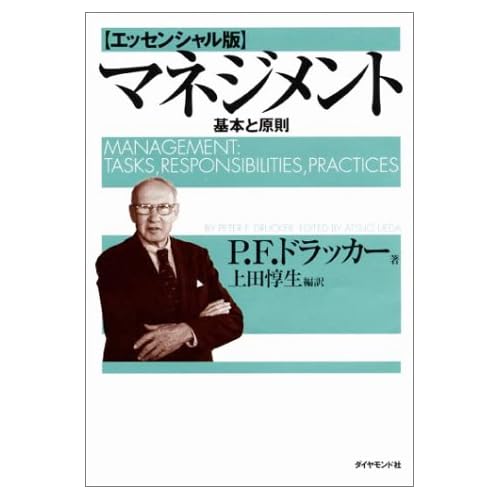Even if we discount the too-perfect aspects and the forced logic of the story, there are more than a few things that we can learn from this high school girl. However, in regards to the learning points which I point out here, and the evaluation of this increasingly popular novel, my opinions are completely different.Masamuneさん, like Minami and Masaoka Naojirou, believes Drucker's book is a good resource. Two pieces of advice, specifically, which Masamuneさん mentioned having read in "Management" made a good deal of sense, so I thought I'd share them here. These are paraphrases from my notes and from my conversation with Masamuneさん, not actual quotes from the book.
If we look at Drucker's assertions as a whole, we assume, as per his definition, that "management" is to guide the enterprise and decide its mission; in addition, to establish objectives,organize resources, and take responsibility for its success.
- The protagonist Minami Kawashima reads the part in which Drucker explains that "Mangers require only one quality, which is not ability, but earnestness" and ponders the meaning of "earnestness" until she comes to an answer. In this world, how many managers are there who have thought so thoroughly?
- When Minami is lost, she comes to believe that she must return to "Management." Again, how many managers have been so diligent as to return to their starting point, reflect on themselves, and try to find a solution?
- And, when give thought to the fact that we must fully interpret the content to put it into practice, the truth is that Drucker's book, "Management" is not necessarily easy to understand.
Drucker also raises three points for management duties.The first is to accomplish the objective and mission peculiar to the organization, the second is to work productively to bear results, and the third is to carry out social duties. Further, if a business' objectives are the creation of the client, Drucker offers marketing and innovation as the function by which those objectives can be achieved. We can define marketing as 'starting from the client' and innovation as 'bringing forth a new contentment.'
Incidentally, what is the relationship between function, objectives, goals, missions, and business guidelines? Or the relationship between the definition and function of management? The further we read the more difficult it becomes to understand the context of Drucker's assertion, and we are unable to grasp the technique necessary to put it all into effect. But Minami clearly explains the almost incomprehensible, nearly unimplementable contents of "Management," simplifies them to their barest, and beautifully puts them into effect.
Let's compare the things which Minami explains and implements with the actual state of the world's managers...
1. 資源と限界をわからないといかない。
Know your resources and your limits.
2. 将来の成果のために、今日の計画を立てる。
Make a plan for today for the sake of your future success/results.
The second especially seems like an all-around good piece of advice. Like I said last post, I am a notorious 計画倒れ. Instead of making plans which always are set to start tomorrow, make them for today (to defeat the procrastination monster). If you're interested in more 名言 (wise sayings) from Drucker, try the following video. Japanese practice and more!
